- Home
- M. K. Hume
King Arthur: Dragon's Child: Book One (King Arthur Trilogy 1) Page 6
King Arthur: Dragon's Child: Book One (King Arthur Trilogy 1) Read online
Page 6
Artorex was truly horrified. The words ‘physical aspects’ had an embarrassing, terrifying ring and the lad turned to face Livinia’s maidservant with trepidation.
Delia was well past thirty years of age and seemed very old to Artorex, although her skin was still fresh and her hair was rich with an auburn sheen. She had served as Lady Livinia’s servant from childhood and was devoted to the interests of her mistress, so Artorex had known her for years, at least from a distance. As Delia stepped forward into the light of the setting sun, Artorex had an opportunity to gauge the kindness in her mild, brown eyes.
Delia had borne five living children and her body was plump and strong. Her hands were her great beauty, although they were calloused from sewing, washing and the women’s work of the villa. Her fingers were long, with sensitive pads and almond-shaped, pale nails, while her palms were unusually large and well fleshed. Those hands were clasped together firmly as she smiled at the thunder-struck young man.
So, in the noontime, Artorex learned how to dance, to turn a courtly sentence and to take a lady’s arm. He mastered courtesy and deportment, and found nothing shameful in conversation with an interesting and intelligent woman. Lady Livinia’s lessons would last the boy for the rest of his life and serve him well as he grew to manhood.
More importantly, Lady Livinia taught Artorex the woman’s point of view, filtered through the Roman matron’s idea of female duty. Without conscious effort, Artorex absorbed Livinia’s values, her style, her respect for family and her uncompromising ability to face painful truths. A single caress upon his hair, as light as thistledown, was cherished as he luxuriated in her regard.
After an afternoon’s toil, Artorex would report to Delia at the servants’ quarters. There, over a period of two weeks, the cheerful and motherly woman taught Artorex the pleasures of the bed. Her warmth, her good humour and her earthy common sense revealed many of the mysteries of women to the round-eyed boy, and for the first time he grew to appreciate the strength and pragmatism of the other sex. Wisely, Lady Livinia contrived to end these special lessons before Artorex teetered on the brink of lovesickness, for this clever matron understood that teacher and pupil might begin to care for each other if their arrangement continued overlong.
Artorex continued with Lady Livinia’s lessons and discovered that he enjoyed his new friendship with Delia. Although any sexual liaison was over, he discussed the relationship with Frith who explained that Delia loved Lady Livinia, not him, and had taken him to her bed for her mistress’s sake. Artorex should be grateful to these two women of such different stations, and free himself from any residual sentimentality.
Artorex examined Frith’s amused blue eyes closely and saw no sign of mockery or falsehood in their clear depths. As he kissed Frith’s withered cheek, Artorex realized that women like Frith, Delia and Livinia, who seemed so delicate and easily shocked, were actually stronger than iron and far more ruthless than a man could ever be.
‘The mistress is a marvel,’ Targo informed the young man after Delia had completed his education. ‘She knows a boy needs guidance or else he’ll likely develop some silly ideas.’
Artorex blushed hotly and wondered what Delia had let slip to her friends.
‘Don’t colour up, boy.’ The warrior smiled at his protégé. ‘I’m reliably told you’ve no cause to be ashamed of your performance.’
Artorex wished fervently that the earth would swallow him whole.
‘It’s a pity that Mistress Livinia didn’t see to the education of young Caius so sensibly. He spends too much time with whores and catamites.’
‘Gossip, Targo?’ Artorex goaded, grateful that Targo had veered off the subject of his sexual education. ‘I thought you disapproved of idle sniping at your betters and their habits.’
Targo responded with a quick clip to Artorex’s ear.
‘Don’t be impertinent, Master Artorex. I see what I see, and a wise man stores away useful information in case he needs it later. Mistress Livinia should have entrusted her son to someone worthy, like Delia - or me for that matter. I’d have been a better guide to the beds of willing maidens than that Severinii brood.’
Wisely, and before Targo became really cross, Artorex changed the subject.
When Artorex turned sixteen and the colt was a yearling, they made a unique pair. Artorex stood at well over six feet and was still growing, and his wild hair was now plaited to tame its curls. He was shapely and strong, yet not so fair as Caius in face and form. But, alongside Artorex, Caius seemed insubstantial and a man of straw, although he was five years older - and had recently brought a wife to the villa.
Coal was still outsized in head and length of leg, but his coat shone from constant brushing and he trotted after Artorex like a dog. Even as a yearling, nimble and unafraid of the most treacherous terrain, he was faster than any other horse at the villa, save for the Gallic gelding owned by Caius. In the Old Forest, his coat made him almost invisible among the shadows of the trees, while he was sure-footed even where the forest was almost impenetrable.
When Artorex reached his seventeenth birthday, and the full duties of manhood, Ector set his foster-son to work. Cletus, the villa’s steward, had succumbed to a lung disease that often kept him to his bed, so the master realized that the time had come to train Artorex as his replacement. On his good days, Cletus taught Artorex the role of steward while the young man served as the steward’s ears and eyes outside the walls of the villa. Artorex rode around the estate checking provisions, supervising the rotation of crops and serving his master with diligence and speed.
Artorex began to understand the responsibility of leadership and the command of men.
Ector blessed the day when Lucius of Glastonbury had sent the boy to him.
Mindful of the promises he had made to Myrddion Merlinus, Luka and Llanwith pen Bryn, Artorex still practised the art of weaponry and horsemanship with Targo on a daily basis, and conducted all farm business from the back of a horse.
The young man’s days were full and he was now permitted, on rare occasions, to eat with the family. These marks of favour occurred at those times of the year when he was required to report on the success of the harvest and the well-being of all those souls who lived at the Villa Poppinidii. Unlike Cletus, who was a slave, Artorex still existed in an odd no-man’s land, neither fish nor fowl, neither slave nor master. As Cletus weakened, Artorex learned how to manipulate the many cogs that made up the machine that was the estate. He also learned to lead men with firmness, fairness and efficiency. He worked with them, when need be, and they appreciated the care he took to protect their interests.
At first, the field hands had resented a young man who issued instructions on irrigation, planting, crop rotation and provisioning. But Artorex brooked no insolence and was only forced to break the jaw of one malcontent before the men accepted his superior leadership qualities and strength. After that, he set out to win them over to him.
Nor did Artorex prove to be insensitive to the constant dangers faced by the ordinary workers who served their masters so faithfully at the Villa Poppinidii. When the servant, Brabix, fell from the colonnade when securing a loose tile on the roof, he lingered for a week before dying. His belly swelled and he howled in agony until Frith mixed a draught made of sap from the bulbous heads of poppy plants to ease his suffering. Artorex kept watch over Brabix with the rest of the servants and promised the delirious man that his wife and child would be welcomed into a lifetime of service at the Villa Poppinidii.
Livinia was heard to say to her woman that the house had not run half so well in the hands of Cletus, but Artorex was always careful to defer to the old, failing man whose skin had turned to parchment, and who seemed to be burning to ash from within.
Only one cloud blotted the blue skies of Artorex’s life. The new wife of Caius, Julanna, whose father claimed to be an unrecognized scion of the Julian line, came to the Villa Poppinidii boasting of the purity of her blood. At first, she seemed the perfect mate
for Caius.
The marriage was arranged between the heads of both families, and little Julanna was a mere thirteen when she was wed to Caius in the old Roman fashion. She was a pale little creature with clouds of soft, nut-brown hair, but behind her initial arrogance she was really a frightened child, completely over-awed by her husband’s family and the life into which she had been thrust.
Her eyes were very dark but without the hard shine of her husband’s pupils. Every line of her face and her plump, soft body was curved and gentle so that she seemed a negligible creature, unable to hold her own in the world of the Villa Poppinidii, where conversation was witty and politically aware, and personalities were strong.
Poor Julanna was outmatched. The servants ignored her, and the mistress smiled kindly and treated her like a child. Her husband was bored within a fortnight, relegating his new wife to the role of an inconvenient visitor.
Nor was Caius a kindly husband. He saw no pressing reason to change his lifestyle now that he was married, and continued to carouse with his friends from Aquae Sulis on every available occasion. Caius considered the running of the estate to be an unfit task for a gentleman and spent his days, and sometimes whole weeks, away from both the villa and his wife.
One morning, Julanna didn’t rise to eat with the family and, when she found a quiet corner of the atrium to work with her distaff, only Livinia and a sharp-eyed Artorex noticed that she had covered most of her face with a gauzy matron’s shawl. Both mother and foster-son saw bruises on her cheeks and jaw through the sheer folds of cloth but, when Livinia asked how she’d been injured, Julanna twisted the wool in her lap and blamed her own clumsiness for an accidental fall.
I’ll wager that Caius is being far too ready with his fists, Artorex thought to himself but, as always, he did not dare to question the word of a respectable matron.
Livinia glanced upward at Artorex as he made his bow to the ladies, and he recognized the resignation in her large, still-brilliant eyes. The mistress identified the weaknesses in her only son, the last of a long line of honourable Roman gentlemen, and she was ashamed of what she’d seen in his nature.
As for Artorex, he had been kept far too busy for years to even contemplate marriage to any woman. Sexual adventures were limited to hasty couplings with kitchen maids in the cow byre. These were satisfying, but hardly lasting. Love for any female hadn’t yet entered his heart, and Artorex was content that this state of affairs should continue. He was happy, his horse grew swiftly under his tutelage and the villa blossomed under his guidance. What more could a young man of seventeen years desire?
Time meant less than nothing to Artorex, except for the change of seasons, the foaling, and the tasks of supervising a large and profitable farm. He would have been content with what he held, were it not for rumblings from the east.
One autumn day, a ragged woman came walking slowly up the road from Aquae Sulis. Her shoulders were bowed with weariness and her hands and feet were wrapped in makeshift mittens of rags. Her age was indeterminate inside the shadow of her hooded cloak
Seated high above her on his horse, Artorex greeted the beggar on the rutted track that led up to the Villa Poppinidii.
‘Master,’ the woman lowered her head. ‘The nights grow cold for a friendless wanderer. May I sleep in your barn before I continue my journey to the north? I will work for my keep.’
What one so ragged and weary could do in recompense for shelter defied Artorex’s logical mind, but the nights were unseasonably cold and he didn’t wish her death on his conscience.
‘Welcome then, mother. Villa Poppinidii can always find a little extra food and somewhere for a stranger to rest.’
Artorex missed the flash of a pair of midnight-blue eyes, as she bowed her head once more in submissive gratitude, for he hadn’t yet learned the full measure of women.
‘When you reach the villa, you’ll find Cletus, the steward, at the kitchens. You may tell him I’ve given you leave to stay one night, and he’ll see to your needs.’
‘And who do I say sent me, young master?’
‘Artorex, foster-son to Lord Ector.’
The woman slowly bowed, as if her spine pained her.
As soon as she trudged away, Artorex forgot her entirely.
That evening, as the family sat down to dinner and Artorex began to supervise the serving of a simple repast, the woman came to him once more. She was now swathed in black, obviously her best clothing which she had carried in a sack during her journey.
‘Master, I tell fortunes and carry news of the world. Would Lord Ector and his noble family desire a little entertainment?’
‘I’ll ask them,’ Artorex replied doubtfully. The ragged beggar appeared to be younger than he’d first thought, although most of her face was still concealed by the shadow of her hood.
While Ector and Caius were uninterested in fortune telling or women’s stories, Livinia chose to be charmed by the offer of amusement and, with a quick glance at Julanna’s pallid face, she decided that the child might be entertained as well.
‘Yes, Artorex,’ she replied imperiously from her couch, for Livinia was the master of the Villa Poppinidii in all but name. ‘You may send the wise woman in to us.’
For reasons that Artorex did not understand, the black-clad woman caused frissons of fear in him and raised the hair on his arms. He ushered her into the family’s presence and then stood against the pillar of the doorway.
‘What is your name, wise woman?’ Livinia asked, with her usual bland courtesy.
The woman raised her head and lowered the cowl that had concealed her face. ‘I’m called Morgan, my lady,’ she replied evenly.
Even Caius, bored and slightly hung-over after a day with his friends, was disposed to stare at the wise woman. He felt his loins harden as her knowing eyes slid over his body.
Morgan was not old, nor even middle-aged; she was beautiful and timeless in the light of the wall sconces. But it was a beauty that both attracted and repelled. Artorex was immediately reminded of Targo’s tale of the Scythian woman and he decided, prudently, to watch her movements very carefully.
Her hair was midnight-black with a long streak of snow that started at her right temple and ran the full length of her head. Her eyes were blue-black and strange, for they sucked in the light and allowed nothing to escape. Her mouth was full-lipped and promised delicious, forbidden pleasures.
Carefully, she removed a silver mirror, a long band of pale, baby-soft leather and a handful of knucklebones from within her robe.
Even Ector leaned forward, curious at last.
‘Ask,’ she said simply. ‘And I will try to answer.’
Livinia deferred to her husband.
‘Will the Villa Poppinidii remain fruitful?’ Ector demanded autocratically, for he was a little afraid of this small woman.
Morgan tied the narrow band of leather over her eyes and stared sightlessly at the mirror’s face. She crooned under her breath.
Artorex stared fixedly at that narrow, pale band.
What is it? he thought to himself. It looks like . . .
His mind was too revolted by the image of soft, human skin to continue with his thoughts.
‘The Villa Poppinidii will last for a long, long time. Its fields will bear for generations to come and, when it is dead at all but the heart, still it will live on in legend, until men in a far off time will find it and make it bloom once more.’
‘Well, that’s a fair prospect,’ Ector replied, seeing none of the menace and all of the good - as usual.
‘Will I bear a son?’ Julanna asked timidly.
Once again, Morgan seemed to listen to silent voices and see strange shapes in her mirror with her covered eyes, although Artorex swore to himself that it was not possible.
‘You will bear children, lady, in pain and travail, and you will hold them in your arms and suckle them. Yet no son will live to spare you from later pain.’
‘But will Villa Poppinidii have children to hold it str
ong, children that are of my blood?’ Livinia asked, for this question meant more to her than any other.
‘Aye, my lady. You will know that they are yours before your ending - and believe yourself blessed. You have earned the forbearance of the gods.’
Artorex shuddered, despite himself. Why did the family smile, refusing to recognize the poison in Morgan’s prophecies?
We hear what we want to hear, Artorex heard Morgan whisper in his head.
Not I! he thought, savagely.
Not you! was the soundless, laughing reply.
Caius was restive for his own turn.
‘Will I be a great landowner and warrior?’ he demanded. ‘And will my name live on after I am dead?’
Morgan stared hard through her leather band. Her hands made strange patterns in the air, and Artorex saw that they were long, clean and comely.
‘Under one form or another, your name will endure down the ages.
You will be steward to a great king and the whole world will know the truth of you.’
The truth of you? Artorex thought furiously. Spare even Caius from such a fate!
But the young master was delighted.
‘Steward to a great king. Renown for ever. Could a man ask for more?’
‘And what of you, Master Artorex?’ Morgan asked softly. ‘Do you have a question for me?’
‘None!’ Artorex snapped. His response was far rougher than he intended.
‘Come, Artorex, it’s only a game,’ Ector admonished.
‘Are you afraid to learn that you will make me a wealthy man, Steward?’ Caius filled the title with enough venom and contempt to poison all the persons present.
‘I fear nothing,’ Artorex retorted.
‘Then cast the bones,’ Morgan demanded evenly and without challenge.
‘Why should I do so? Can you not see my future, as you did for the family?’
‘My gift is not easily mastered. Cast the bones, Master Artorex, and I will tell your fate.’
Unwillingly, Artorex picked up the knucklebones.
They were smooth and slick under his fingers and seemed to quiver as if they were still alive. Instinctively, Artorex knew they had once been part of a human hand.

 The Emperor's Blood (e-novella)
The Emperor's Blood (e-novella)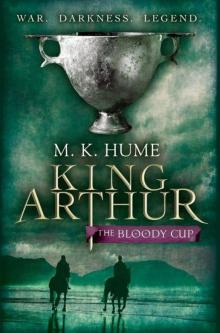 King Arthur: The Bloody Cup: Book Three
King Arthur: The Bloody Cup: Book Three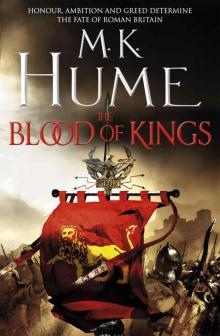 The Blood of Kings: Tintagel Book I
The Blood of Kings: Tintagel Book I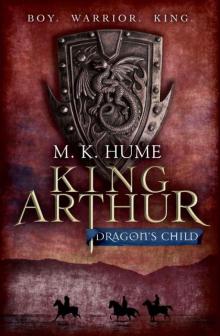 King Arthur: Dragon's Child: Book One (King Arthur Trilogy 1)
King Arthur: Dragon's Child: Book One (King Arthur Trilogy 1)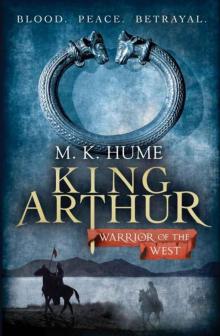 King Arthur: Warrior of the West: Book Two
King Arthur: Warrior of the West: Book Two The Storm Lord
The Storm Lord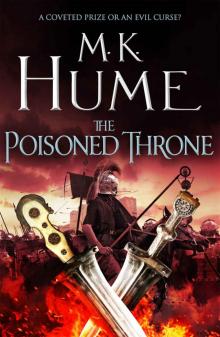 The Poisoned Throne: Tintagel Book II
The Poisoned Throne: Tintagel Book II![M. K. Hume [King Arthur Trilogy 04] The Last Dragon Read online](http://i1.bookreadfree.com/i2/04/07/m_k_hume_king_arthur_trilogy_04_the_last_dragon_preview.jpg) M. K. Hume [King Arthur Trilogy 04] The Last Dragon
M. K. Hume [King Arthur Trilogy 04] The Last Dragon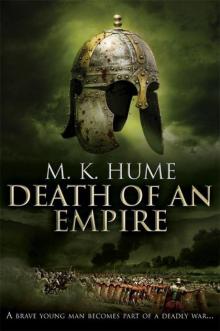 Prophecy: Death of an Empire: Book Two (Prophecy Trilogy)
Prophecy: Death of an Empire: Book Two (Prophecy Trilogy)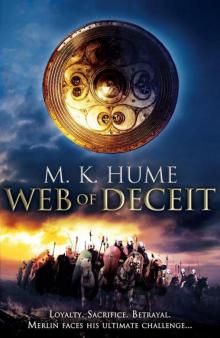 Prophecy: Web of Deceit (Prophecy 3)
Prophecy: Web of Deceit (Prophecy 3)